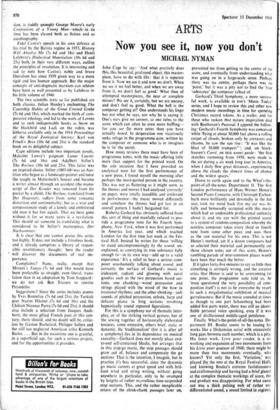Cape of good hope
MARTIN SEYMOUR-SMITH
Cdipt editions, perhaps the most remarkable.: publishing series launched since the war, has now reached its twenty-sixth volume. There can already be no more essential single key to the development of twentieth-century thought and letters than the collection as it stands. The aim, as stated and admirably fulfilled, 'is to make available primary, original statements as well as neglected classic texts which, by virtue of length or subject, have not.previously fitted the conventions of book publishing programmes.
Plays, poems, essays, short fiction, memoirs, criticism will be accompanied by scientific papers. . . Translations particularly will be fostered.'
No truck whatever is had with commercial requirements, and—even if many copies of the series will repose, unread, on shelves in Hamp- stead 'and Chelsea—the venture is nevertheless a brave and bold one. The general editor is an anthropologist, Nathaniel Tarn, who writes verse in a continental and South American sur- realist tradition. I have the gravest reservations about the adaptability of the English language to this kind of influence when it is so directly applied; but Mr Tarn does it knowledgeably, and 'clearly he is eminently suitable for this• position, since most of the important things that have happened recently in philosophy, lin- guistics, anthropology, science and letters have hapPened in - Europe or in North or South America.
Roland Barthes, whose Writing Degree Zero and Elements of Semiology (both 7s 6c1 paper- back 18s hardback) appear in the series, may be a humourless and frequently over-obscure critic; but what he has to say, especially about the Teal nature of literature, is of supreme im- portance. You can reject him, or you can sub- ject his theories to severe modification, but it is certainly necessary to make the considerable effort required to understand him; not one Eng- lish critic has, so far, even attempted to come to terms with his formidable intelligence. Until this happens, British criticism will be the poorer: Barthes's challenge, that 'a modern masterpiece is impossible' because at the moment of creation the writer 'observes a tragic disparity between what he does and what he sees,' although un- acceptable and especially comfortless to simple- minded enthusiasts of 'modernity,' is valid. We seem now to be altogether too knowing, too sophisticated, to produce masterpieces; by understanding Barthes's pessimistic but acute analysis of the situation (and by noting its flaws: solemnity, absence of a sense of comedy), we can only move in the direction of improving it. Whatever else he may not be. Barthes is a truly seminal critic, whose neglect in this country is symptomatic; perhaps it is significant that his most lucid book, Sur Racine (1963), unpublished here, has been available in America since 1964.
Barthes is not the only French writer to be represented in the series; Claude Ldvi-Strauss's inaugural lecture as a Professor at the College de France, The Scope of Anthropology (7s 64
and 15s),.is now available anywhere in the world only in,this edition. Structuralism, the study of the structure rather than the sequence or func- tion of phenomena—the synchronic, rather than the more traditional, diachronic approach-- is fast becoming a vogue word; but Levi-Strauss,
whose work has now been made the subject of special study at Cambridge, is as seminal a thinker as Barthes, and in a much wider field. This .witty and ironic lecture is an indispensable
introduction to his larger works, such as Le Cru et le Cult, in which he posits what may be called. a new, an intelligible and a potentially explosive Version of what Christians have been rather mechanically taught to regard as 'the Fall.' Such thinking can only fertilise the Anglo- Saxon imagination; it is indispensable to any educated mind.
Levi-Strauss believes Michel Leiris to be 'one of the greatest living writers' in France; his Manhood (10s 6d and 25s), in some ways the most remarkable autobiography of the century, is now made available here for the first time. One hopes that it will subsequently be followed by the three volumes that succeed it: Biffures, Fourbis and Fibrilles. Leiris, who was an early surrealist, and who is also a noted anthropo- logist, demonstrates in his series of extraordin- ary self-analyses that the themes of such younger writers as Barthes (all of whose writ- ings are frequently unattractive, even pompous) are vital: his work, like Cdline's, in Barthes's uncharacteristically memorable phrase, 'really represents the writer's descent into the sticky opacity of the condition which he is describing'; he comes near to realising his own being in the act of writing. The nearest thing to this in Eng- lish, though in the more or less genteel tradi, don; is (oddly rtough)- George -Moant's .early Confessions of a Young Man—which;in-its time has -been classed both as fiction and as autobiography.
Fidel Castro's speech in his own defence at his trial by the Batista regime in 1953, History Will Absolve Me (7s 6d and 18s) and Henri Lefebvre's Dialectical Materialism (10s 6d and 25s) both, in their very different ways, outline
the principles of revolution. It is interesting and sad to note how Castro's noble and brave liberalism has since 1959 given way to a more rigid and less human approach. But the major concepts of anti-dogmatic marxism can seldom have been as well presented as by Lefebvre in his little volume of 1940.
The two scientific texts so far published are both classics. Julian Huxley's enchanting The
Courtship Habits of the Great Crested Grebe
(7s 6d and 18s), which marked the birth of com- parative ethology and led to the work of Lorenz
and to such indispensable books as Snow on
the blackbird and Lack on the robin, was hitherto available only in the 1914 Proceedings of. the Royal Zoological Society; Karl von Frisch's Bees (10s 6d and 21s) is the standard book on its delightful subject.
Cape editions include two important novels, Malcolm Lowry's poignant Lunar Caustic (7s 6d and 16s) and Adalbert Stifter's The Recluse (10s 6d and 25s). This latter was an inspired choice. Stifter (1805-68) was an Aus-
trian who began as a landscape-painter and tutor (he taught in Metternich's house) and became a writer almost through an accident (the manu-
script of Der Konder was removed from his pocket by a child). The Recluse, translated from Der Hagestolz, suffers from some romantic
distortion and sentimentality; but as a wise and compassionate study of a lonely and embittered old man it has few equals. That we have gone
without it for so many years is a revelation. This should set someone to translating what is considered to be Stifter's masterpiece, Der Nachsommer.
It is clear that one cannot praise this series too highly. It does not include a frivolous book,
and it already comprises a library of respon- sible revolutionary thought: here the reader ' will discover the documents of real im- portance.
Complaints? None, really, except that Mrozek's Tango (7s -6d and 18s) would have been preferable 'as straight, even literal; trans- lation than in an adaptation by Tom Stoppard: we do not ask Ben Travers to rewrite Pirandello.
Suggestions? Since the series includes poems by Yves Bonnefoy (7s 6d and 21s), the Turkish poet Nazim Hikmet (7s 6d and 16s) and the Chilean Nicanor Parra (7s 6d and 21s), it should also include a selection from Jacques Audi- berti, the most gifted French poet of this cen-
tury; there should, and no doubt will be, critic- ism by Gaston Bachelard, Philippe Sollers and
the still too neglected American critic Kenneth Burke.... But in the meantime one is grateful, in a superficial age, for such a serious project, and for the opportunities it provides.















































 Previous page
Previous page